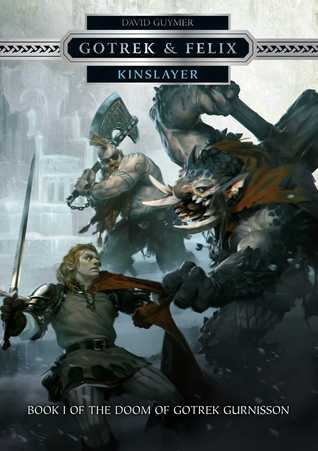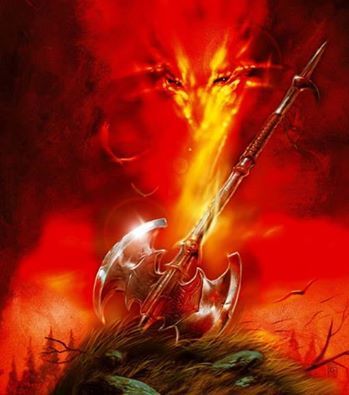The Writing of Slayer
Gotrek & Felix: Slayer is probably the most important novel I’ve written to date. When I was first to asked to write the Doom of Gotrek Gurnisson the immediate feeling was one of elation, descending slowly, slowly, but oh so inexorably into a kind of mewling terror. As I wrote last week, the cosy safety of one’s writing burrow can’t hide the fact that ‘out there’ are many thousands of rabid Gotrek & Felix fans, possibly with pitchforks, some of whom will have been following their adventures for twenty years and will not, not, tolerate an inferior offering for their beloved saga’s conclusion. If ever there was a time for a man to up his game, and get up off the kitchen floor then this was it.

Where it all began
(The King era)
Trollslayer (1999)
Skavenslayer (1999)
Daemonslayer(1999)
Dragonslayer (2000)
Beastslayer (2001)
Vampireslayer (2002)
Giantslayer (2003)
(The Long era)
Orcslayer (2006)
Manslayer (2007)
Elfslayer (2008)
Shamanslayer (2009)
Zombieslayer (2010)
(Collected Stories)
Slayer of the Storm God (2009)
Gotrek and Felix: The Anthology (2012)
Gotrek & Felix: Curse of the Everliving (2013)
Gotrek & Felix: Lost Tales (2013)
(The interregnum)
Road of Skulls (2013)
Gotre & Felix: City of the Damned (2013)
The Serpent Queen (2014)
(The Doom of Gotrek Gurnisson)
Gotrek & Felix: Kinslayer (2014)
Gotrek & Felix: Slayer (2015)
That’s a lot of books with, cumulatively, about 10,000 ratings and an average rating of comfortably around 4/5. That's not counting the brilliant Grey Seer Thanquol or Ulrika the Vampire spin-off series'. They also go back a long way, and even further if you count the short stories in the old gaming supplements. I even pleasantly surprised myself recently, flicking through a 4th edition Warhammer Undead army book and found a Gotrek & Felix book I’d forgotten about (fun fact – Gotrek & Felix originally arose from William King’s roleplaying sessions. And apparently, if you go back you can see the point in the short story Geheimnisnacht at which Gotrek was originally meant to die!).
Even though I’d grown up with Gotrek & Felix this meant a lot of reading, particularly as I wasn’t completely up-to-date (I hadn’t read the last two Nathan Long books yet). Crafting a satisfying conclusion to a 12 book saga in just two more volumes therefore required a great deal of notes, much scratching of heads, and one very, very long conversation with an editor. A lot of people have asked me since Kinslayer first came out if I consulted with William King or Nathan Long before starting to write, and the answer to that question is no.

I wanted The Doom of Gotrek Gurnisson to be as true to the feel of Gotrek & Felix as a new author could make it, but at the same time to fit the story into the wider narrative of the End Times and make the characters my own. That’s part of the reason why an older, more bitter Felix appealed; imagining how the characters would have turned out had Felix finally got the settled life he’d been wanting and waved Gotrek on his way.
Of the two novels, I’m actually marginally fonder of Kinslayer. It was a chance for me to revisit a lot of beloved locales before the End Times took them all away, a valedictory tour of the Old World in words. Added to that, Throgg and Helbrass turned out to be two of the most entertaining villains to write, every scene with Snorri Nosebiter was a blast, and the fight between him and Throgg at the end ranks as one of my all-time favourites. Neatly squaring a lot of plot circles in the process was a bonus.
Plus I cried. I cried a lot. And not just at the end.

Slayer was an altogether different beast. After all the bridges that had been burnt in Kinslayer it only really owed Kinslayer itself in terms of narrative loose ends. Ultimately, this book is all about Gotrek’s doom and his friendship with Felix – as it should be. While Kinslayer left me in tears, this book left me physically shaking. The final third I wrote in a flurry of middle of the night sessions hunched over my kitchen table with pen and paper. The rush to the climax had me, but it’d also be true to say that the birth of my first daughter (about six months old at the time, and with a cameo near the end) had me severely behind with my deadline. I wouldn’t recommend that style of writing for anyone that values their ability to perform basic human functions, but I can’t say it didn’t work for me or to the benefit of the story. My editor (different one by this point) wrote back to me that that final third was the best stuff I’d written and by the time I’d caught up on sleep and D vitamins I could see that he was right.
But I still won’t be doing it again.
The one time that I’ve met William King was at the Black Library Weekender 2012. This was before I’d started on my debut novel, but after I’d written Curse of the Everliving. I went to his Q&A panel where someone asked him how he saw Gotrek & Felix ending and he jokingly answered that it would have to be fighting the four Chaos Gods themselves while the world around them exploded.
Spoilers aside, I don’t think he’d be too disappointed with the outcome.

Vote for the Gemmell Awards here: http://www.gemmellawards.com/award-vo...
As well as marking the imminent paperback release (see what I cunningly did here?), this is also a reminder that there are two short weeks left to vote in the David Gemmell Awards to which Slayer has been shortlisted. The full lists are:
(Legend Award (best novel))
The Dread Wyrm by Miles Cameron (Gollancz)
Son of the Black Sword by Larry Correia (Baen)
Gotrek & Felix: Slayer by David Guymer (Black Library)
Ruin by John Gwynne (Pan Macmillan)
The Liar’s Key by Mark Lawrence (Harper/Voyager)
(Morningstar Award (best debut))
Battlemage by Stephen Aryan (Orbit)
The Traitor by Seth Dickinson (Pan Macmillan)
The Fire Sermon by Francesca Haig (Harper/Voyager)
Starborn by Lucy Hounsom (Pan Macmillan)
The Vagrant by Peter Newman (Harper/Voyager)
An Ember in the Ashes by Sabaa Tahir (Harper/Voyager)
My own debut novel, Headtaker, made it to the shortlist for the Morningstar in 2014 and I was gutted to miss out on it so, a) don’t put me through that again with Slayer this year, and b) if you’ve read a book on this list that you think deserves recognition, then go vote for it!
(Ravenheart Award (best cover art))
Kerem Beyit for The Dread Wyrm by Miles Cameron (Gollancz)
Jason Chan for The Liar's Key by Mark Lawrence (Harper/Voyager)
Larry Elmore & Carol Russo Design for Son of the Black Sword by Larry Correia (Baen)
Raymond Swanland for Archaon: Lord of Chaos by Rob Sanders (Black Library)
Paul Young for Ruin by John Gwynne (Pan Macmillan)
Voting on the shortlists will close at midnight (GMT) on Friday 19th August. The results will be announced at a presentation ceremony taking place at 8pm on Saturday 24th September at Fantasycon in Scarborough, UK.
Both Elfslayer and Shamanslayer, written by Nathan Long, have previously been nominated for the Legend Award but neither took home the axe. Did I mention? The Trophy’s AN AXE.
You can read more about my thoughts on the Gemmell Awards in my previous blog post, but I have a feeling that 2016 could be Gotrek & Felix’s year.
Remember me.
Here a Slayer lies.

Where it all began
(The King era)
Trollslayer (1999)
Skavenslayer (1999)
Daemonslayer(1999)
Dragonslayer (2000)
Beastslayer (2001)
Vampireslayer (2002)
Giantslayer (2003)
(The Long era)
Orcslayer (2006)
Manslayer (2007)
Elfslayer (2008)
Shamanslayer (2009)
Zombieslayer (2010)
(Collected Stories)
Slayer of the Storm God (2009)
Gotrek and Felix: The Anthology (2012)
Gotrek & Felix: Curse of the Everliving (2013)
Gotrek & Felix: Lost Tales (2013)
(The interregnum)
Road of Skulls (2013)
Gotre & Felix: City of the Damned (2013)
The Serpent Queen (2014)
(The Doom of Gotrek Gurnisson)
Gotrek & Felix: Kinslayer (2014)
Gotrek & Felix: Slayer (2015)
That’s a lot of books with, cumulatively, about 10,000 ratings and an average rating of comfortably around 4/5. That's not counting the brilliant Grey Seer Thanquol or Ulrika the Vampire spin-off series'. They also go back a long way, and even further if you count the short stories in the old gaming supplements. I even pleasantly surprised myself recently, flicking through a 4th edition Warhammer Undead army book and found a Gotrek & Felix book I’d forgotten about (fun fact – Gotrek & Felix originally arose from William King’s roleplaying sessions. And apparently, if you go back you can see the point in the short story Geheimnisnacht at which Gotrek was originally meant to die!).
Even though I’d grown up with Gotrek & Felix this meant a lot of reading, particularly as I wasn’t completely up-to-date (I hadn’t read the last two Nathan Long books yet). Crafting a satisfying conclusion to a 12 book saga in just two more volumes therefore required a great deal of notes, much scratching of heads, and one very, very long conversation with an editor. A lot of people have asked me since Kinslayer first came out if I consulted with William King or Nathan Long before starting to write, and the answer to that question is no.

I wanted The Doom of Gotrek Gurnisson to be as true to the feel of Gotrek & Felix as a new author could make it, but at the same time to fit the story into the wider narrative of the End Times and make the characters my own. That’s part of the reason why an older, more bitter Felix appealed; imagining how the characters would have turned out had Felix finally got the settled life he’d been wanting and waved Gotrek on his way.
Of the two novels, I’m actually marginally fonder of Kinslayer. It was a chance for me to revisit a lot of beloved locales before the End Times took them all away, a valedictory tour of the Old World in words. Added to that, Throgg and Helbrass turned out to be two of the most entertaining villains to write, every scene with Snorri Nosebiter was a blast, and the fight between him and Throgg at the end ranks as one of my all-time favourites. Neatly squaring a lot of plot circles in the process was a bonus.
Plus I cried. I cried a lot. And not just at the end.

Slayer was an altogether different beast. After all the bridges that had been burnt in Kinslayer it only really owed Kinslayer itself in terms of narrative loose ends. Ultimately, this book is all about Gotrek’s doom and his friendship with Felix – as it should be. While Kinslayer left me in tears, this book left me physically shaking. The final third I wrote in a flurry of middle of the night sessions hunched over my kitchen table with pen and paper. The rush to the climax had me, but it’d also be true to say that the birth of my first daughter (about six months old at the time, and with a cameo near the end) had me severely behind with my deadline. I wouldn’t recommend that style of writing for anyone that values their ability to perform basic human functions, but I can’t say it didn’t work for me or to the benefit of the story. My editor (different one by this point) wrote back to me that that final third was the best stuff I’d written and by the time I’d caught up on sleep and D vitamins I could see that he was right.
But I still won’t be doing it again.
The one time that I’ve met William King was at the Black Library Weekender 2012. This was before I’d started on my debut novel, but after I’d written Curse of the Everliving. I went to his Q&A panel where someone asked him how he saw Gotrek & Felix ending and he jokingly answered that it would have to be fighting the four Chaos Gods themselves while the world around them exploded.
Spoilers aside, I don’t think he’d be too disappointed with the outcome.

Vote for the Gemmell Awards here: http://www.gemmellawards.com/award-vo...
As well as marking the imminent paperback release (see what I cunningly did here?), this is also a reminder that there are two short weeks left to vote in the David Gemmell Awards to which Slayer has been shortlisted. The full lists are:
(Legend Award (best novel))
The Dread Wyrm by Miles Cameron (Gollancz)
Son of the Black Sword by Larry Correia (Baen)
Gotrek & Felix: Slayer by David Guymer (Black Library)
Ruin by John Gwynne (Pan Macmillan)
The Liar’s Key by Mark Lawrence (Harper/Voyager)
(Morningstar Award (best debut))
Battlemage by Stephen Aryan (Orbit)
The Traitor by Seth Dickinson (Pan Macmillan)
The Fire Sermon by Francesca Haig (Harper/Voyager)
Starborn by Lucy Hounsom (Pan Macmillan)
The Vagrant by Peter Newman (Harper/Voyager)
An Ember in the Ashes by Sabaa Tahir (Harper/Voyager)
My own debut novel, Headtaker, made it to the shortlist for the Morningstar in 2014 and I was gutted to miss out on it so, a) don’t put me through that again with Slayer this year, and b) if you’ve read a book on this list that you think deserves recognition, then go vote for it!
(Ravenheart Award (best cover art))
Kerem Beyit for The Dread Wyrm by Miles Cameron (Gollancz)
Jason Chan for The Liar's Key by Mark Lawrence (Harper/Voyager)
Larry Elmore & Carol Russo Design for Son of the Black Sword by Larry Correia (Baen)
Raymond Swanland for Archaon: Lord of Chaos by Rob Sanders (Black Library)
Paul Young for Ruin by John Gwynne (Pan Macmillan)
Voting on the shortlists will close at midnight (GMT) on Friday 19th August. The results will be announced at a presentation ceremony taking place at 8pm on Saturday 24th September at Fantasycon in Scarborough, UK.
Both Elfslayer and Shamanslayer, written by Nathan Long, have previously been nominated for the Legend Award but neither took home the axe. Did I mention? The Trophy’s AN AXE.
You can read more about my thoughts on the Gemmell Awards in my previous blog post, but I have a feeling that 2016 could be Gotrek & Felix’s year.
Remember me.
Here a Slayer lies.
Published on August 04, 2016 08:58
•
Tags:
gemmell-awards, gotrek-felix, nathan-long, william-king
date newest »
newest »
 newest »
newest »
message 1:
by
David
(last edited Aug 05, 2016 12:25AM)
(new)
Aug 04, 2016 08:59AM
 Also, look out for an uncredited guest appearance in Slayer from Grizzhtadt the Everliving!
Also, look out for an uncredited guest appearance in Slayer from Grizzhtadt the Everliving!
reply
|
flag



